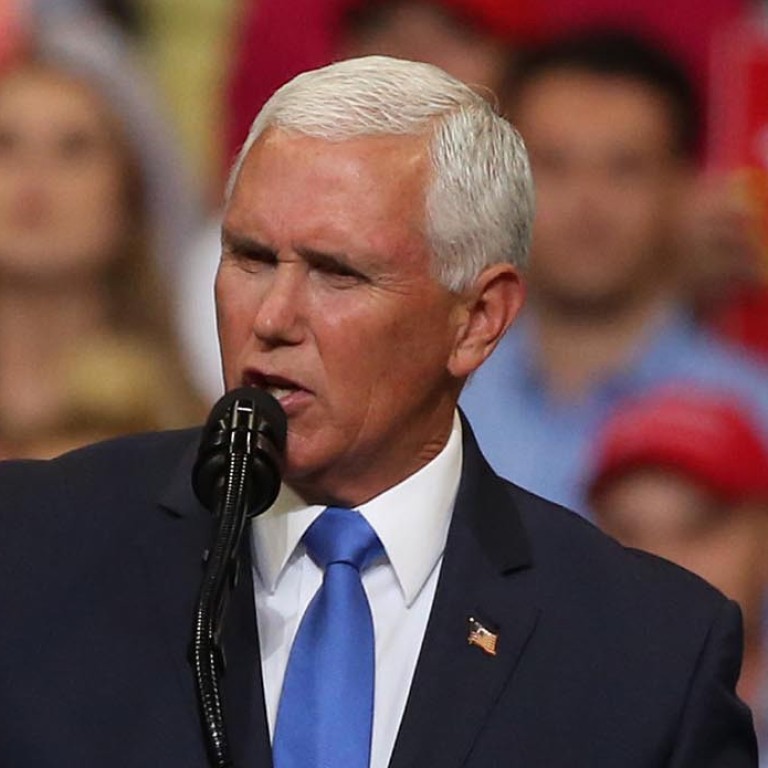
US VP Mike Pence’s speech, expected to be critical of China, postponed because of ‘progress’ ahead of leaders’ G20 meeting
- The address, scheduled for Monday, would have been delivered just days before Trump and Xi meet in Japan and as hopes rise for progress in the trade war
- Pence has a history of condemning Beijing for its human rights record and militarisation of the South China Sea
An upcoming speech by US Vice-President Mike Pence in which he was expected to criticise China’s human rights record has been postponed because of “progress in conversations” between the two countries’ leaders, the White House said on Friday.
It was anticipated that the address, scheduled for Monday at the Wilson Centre in Washington, would address religious freedoms in China, where more than 1 million Uygurs and other largely Muslim minority groups have been detained in mass internment camps and reportedly subjected to political indoctrination.
“The vice-president’s office is postponing Monday’s speech due to progress in conversations between President [Donald] Trump and President Xi [Jinping],” the White House said in a statement.
The Wilson Centre also confirmed the change.
“There is room for progress, and even if incremental, we didn’t want to step on that potential,” Reuters reported a White House official as saying on condition of anonymity.
Trump and Xi confirmed this week that they would meet on the sidelines of the G20 summit in Osaka, Japan, which will take place next Friday and Saturday, just days after Pence’s speech was to be delivered.
Chinese students in US fear backlash after Mike Pence speech
Announcing the meeting with Xi, Trump said on Tuesday that trade talks were restarting after a six-week impasse in which both sides have blamed each other for the breakdown in negotiations.
An address by Pence in October at the Hudson Institute, in which he condemned China’s human rights record, model of globalisation and militarisation of the South China Sea, was seen as deepening tensions between Washington and Beijing, with some observers comparing it to a modern-day “iron curtain” speech.
Pence “looks forward to delivering” the address “in the near future”, the White House statement said.
The White House move for the sake of “progress” in trade talks was met with dismay among human rights advocates.
“Does the ‘progress’ referenced include a commitment from President Xi to close the ‘political education’ camps in Xinjiang?” asked Sophie Richardson, China director at Human Rights Watch.
“If not, it’s another disturbing example of the Trump administration’s willingness to blithely politicise human rights.”
Friday’s move all but extinguishes hopes that the administration will soon move ahead with sanctions on Chinese officials over Beijing’s mass internment programmes in the country’s far western Xinjiang Uygur autonomous region.
Trump-Xi G20 meeting welcomed, but trade war’s damage to linger
A sanctions package has been finalised with consensus from the departments of state, treasury, commerce and defence, but awaits approval at the cabinet-secretary level.
Implemented under the Global Magnitsky Act, the action – which some had hoped would be previewed in Pence’s June 24 speech – would target Chinese Communist Party officials deemed responsible for the internment camps in Xinjiang with the freezing of US-based assets and denial of entry onto US soil.
The administration’s unwillingness to implement such sanctions, Richardson said, suggested that “it won’t move beyond the relatively easy rhetorical condemnation of China’s policies to make Beijing pay a real price for the agony it’s inflicting on Uygurs and so many others.”

